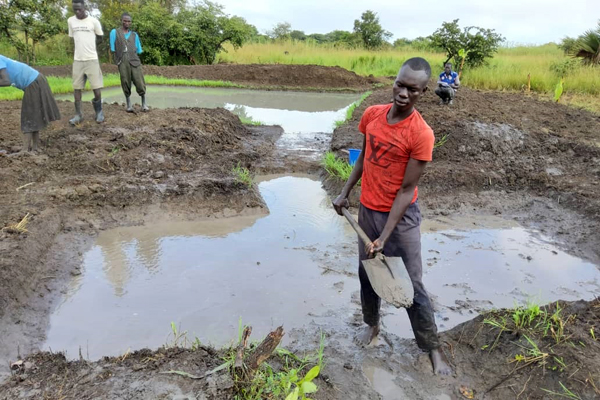Residents prepare for adverse weather events

Youth construct a flood-control structure in Geregere Sub-county, Agago District, in October. Photo/ Bill Oketch
What you need to know:
- Locals construct retention ponds to store water when it rains.
Several households in Agago District have embarked on constructing flood-control structures to mitigate the effects of climate change.
In groups consisting between six and 10 members, residents have excavated water retention ponds with a capacity of 5,000 cubic litres, which store water when it rains. When the dry spell comes, the harvested water is then used for irrigation.
So far, 10 structures have been constructed in Geregere Sub-county.
Following the rising water levels on Lake Kyoga and other rivers in Agago, rural communities have been losing houses, livestock and food crops to floods from the rivers.
To mitigate these adverse effects of climate change, locals in Agago District, among other areas, have been taught to build the water retention ponds and conduct other measures under the Enhancing Resilience of Communities to Climate Change through Catchment-based Integrated Management of Water and Related Resources in Uganda (EURECCCA) project.
Mr Robert Bogere, a senior hydrologist at the Ministry of Water and Environment, says due to increased effects of climate change and population growth, the hydrological cycle has been destabilised.
“God was kind enough that he provided the earth with the ability to satisfy man’s needs but not his greed. Since man became greedy, the cycle was destabilised and you find that right now, we receive too much rainfall; we end up having too much surface runoff, resulting in floods,” he says.
Experts say the country is suffering from the adverse effects of climate change because of human activities on ecosystems such as wetlands, water bodies and other resources.
The Ministry of Water and Environment says with financial support from the Adaptation Fund through Sahara and Sahel Observatory, new and sustainable ways to feed Uganda’s growing population, has been found.
Under EURECCCA project that commenced in 2017, revolving funds and inputs are given to communities to demarcate and restore degraded wetlands and riverbanks using markers and concrete pillars. So far, 85 kilometres of river banks and 270.9 hectares of buffer zones have been demarcated and restored within Aswa Catchment area.
The project also supplied a total of 382,694 tree seedlings of assorted species to restore 958 acres of degraded landscape, according to official data.
Mr Richard Musota, the team leader for Upper Nile Management Zone, says the overall goal of the project, which will expire in 2023 is to reduce floods within the three catchments of Aswa, Majiba and Awoja.
Mr Musota reveals that each water and environment cooperative will receive a seed fund of $25,000 (about Shs88 million). The members can borrow the money and use it for income-generating activities.
“EURRECA was crafted around getting communities to behave smarter around ecosystems so that they are able to cope with these extreme events when they come,” he says .
In Kitgum District, hundreds of farmers from 27 villages in four parishes in Orom Sub-county have demarcated and restored Karikilet, Lokokwayi and Kadukuye river systems which had been severely degraded.
Mr Justine Otika, the chairperson of micro catchment management committee, says: “Under the project, we have planted 16,000 bamboo shoots and restored 57 hectares of buffer zone. We also planted 481 pillars and demarcated 48.1kms of Karikilet, Lokokwayi Kadukuye river banks.”
Mr Cyprian Onyango, the chairperson of Karikilet, Lokokwayi Kadukuye Cooperative Society, says they want to be able to cope with the extreme weather events when they come. “We have realised the need to conserve our environment and the wetlands through training. We have also been trained to engage in income-generating activities,” he says.
Ms Kevine Joyce Atim, Kitgum District vice chairperson, applauds the government for the intervention. “I believe when the communities finally receive the revolving fund, their lives are going to change forever,” she says.
Dr Laban Turyagyenda, the director of Ngetta Zonal Agricultural Research Development Institute, says they have developed demonstration plots on alternative income-generating activities.
“During dry season, you find our people in the swamps hunting for fish and that one destroys the environment,” Dr Turyagyenda says.
“When you go there (in the swamps) you think they are busy digging for gold, yet they are hunting for fish. So, we want to see if we can have fish farming as a way of conserving our swamps and wetlands.”




